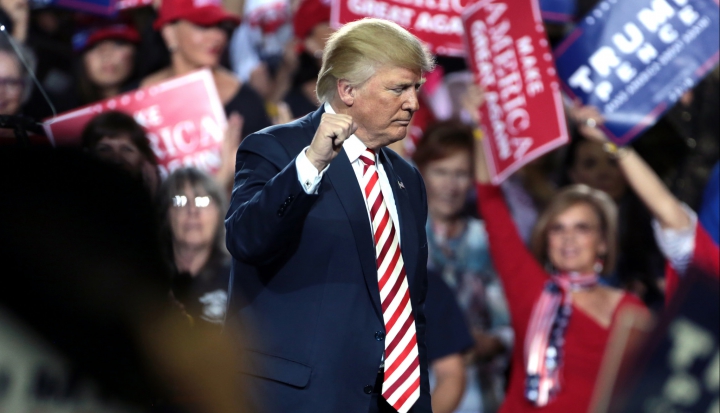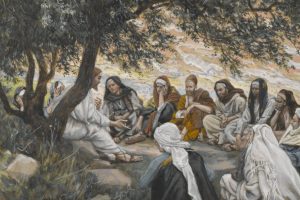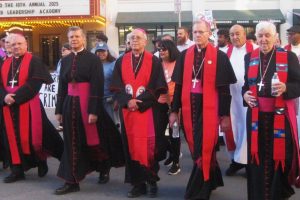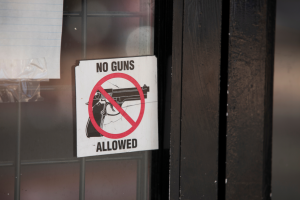What difference does the faith of an American president make? In the United States, we go to great pains to keep church and state separate—in theory anyway. Should it matter what the head of state believes about God, or if he or she believes in God at all?
“Most of the past presidents would tell you that they actually prayed in the Oval Office, that they made decisions daily that affected millions of lives. They were often uncertain about what was the right thing to do. In those cases, they drew on their religious background,” says David L. Holmes, professor emeritus of religious studies at Virginia’s College of William and Mary and author of two books on the faiths of presidents. “That’s why I think it is important for them, for voters, for citizens. It’s important because people are looking for honesty and reliability in their politicians.” That said, Holmes points out, while there is a presumption that religious faith translates to a “better bet” for honesty and reliability from a president, “We know that isn’t necessarily the case. We just went through an election where that was looked at rather carefully.”
I spoke with Professor Holmes recently over the phone, to follow up to an interview he did with U.S. Catholic in 2012. At that time Republicans had nominated Mitt Romney, a Mormon, to run against the Democratic incumbent, Barack Obama—whose Christian faith many debated.
As this country inaugurates a new president who won both the white evangelical and Catholic vote, it seems appropriate to consider where Donald Trump’s faith fits within the context of the faiths of his predecessors. Will he consult his religious faith, will he pray as he is faced with the task of leading this country? This is the task for historians of the future to decide.
What do we know about Trump’s religious upbringing?
Like most of us, Trump was influenced by the faith of his parents. Three‑quarters of the presidents we’ve had since World War II ended up in the very same interpretation of Christianity in which they were raised. That seems to be a pretty good national statistic. Trump is no exception.
Trump’s heritage is Protestant and European. His father came from Lutheran stock in Germany. We don’t know how religious his father’s family was, but the father attended church faithfully throughout his life. Trump’s mother came from a highly religious area of Scotland, where a branch of Presbyterianism, called the “Wee Frees” (the nickname for the small Free Church of Scotland), is still strong today.
Maryanne Macleod, Trump’s mother, immigrated to the United States as a strict Presbyterian. She seems to have become broader in religion in later years, but she ensured that all of her children were raised Presbyterian.
Trump identifies himself as a mainline Protestant. But if we want to understand him, we would be better off to pay attention to his social, economic, and cultural upbringing, and not to his experience in church. Trump’s father, Fred, was a developer, a field which he quit school to enter. The Trumps lived in Jamaica, Queens, in an area where Fred built many of the houses, often in the Tudor revival style. The home he built for his family was huge: 23 rooms. They had live‑in help, a chauffeur and a maid. They had two Cadillac limousines.
Fred Trump was an interesting guy. I wish we had more history on him. He did things like wear a hat and a tie when the family went to the beach. He may have had a formal side. He was all business. Religiously, he was Lutheran in background, but the crossover to Presbyterianism is hardly a step. He also displayed some anti-Semitism.
Weren’t Trump’s parents members of Marble Collegiate Church when Norman Vincent Peale, the author of the hugely influential The Power of Positive Thinking, was the pastor?
Yes, their first church was the First Presbyterian Church in Jamaica, Queens—a big, historic church. It was on the edge of a change in the affluent neighborhood, so it had some black members. It had leading pastors.
The Trumps knew of the reputation of Norman Vincent Peale. Peale attracted the New York business community, and many CEOs were members of Marble Collegiate. The church was 13 miles away from the Trump home and hence a relatively long drive to reach church. But when Trump was 28 years old, his parents transferred their membership to Marble Collegiate. Trump never officially transferred, but from that year on Marble Collegiate was the family church. The Trump family not only attended regularly, but also used it for baptisms, marriages, and funerals.
The relationship between Trump and his new pastor, Norman Vincent Peale, developed into a friendship. Although they were a half-century apart in age, Peale really liked Trump. And even now, almost a quarter century after Peale’s death, Trump can’t stop praising Peale. It was an important relationship and one that has made Trump rather content with his religious background. Relatively few of the presidents who have served in the 20th century have had such a close adult relationship with a pastor.
We’re getting a lot of prosperity gospel from Trump’s most public evangelical supporters. Is there a connection here to Peale?
I think there is. If we read his bestselling, but theologically controversial, book, The Power of Positive Thinking, we find that he believed a life faithful to Jesus Christ could bring material success and psychological and physical health—in other words, prosperity.
But Peale was not simply a prosperity gospel preacher. Those who attended the church will tell you that he also did straight biblical or doctrinal preaching, the kind we’d encounter in a typical Protestant or Catholic church.
Donald Trump is said to have experienced a conversion at some point during the presidential campaign. Has there ever been a president in our history said to have experienced a conversion while campaigning?
I know of none. I checked with Professor Gary Scott Smith, who has written on the religion of 22 American presidents. He said that none experienced a conversion during the campaign.
Trump would have been the first—but we have no real facts on his supposed conversion. The evangelical leader James Dobson attributed the conversion to the megachurch pastor Paula White. Dodson told a large meeting of evangelicals that the conversion had just occurred and that Trump was still a “baby Christian.”
But when evangelicals checked, they stopped talking about this supposed conversion because Ms. White was rather vague in her description of what happened. Paula White is not necessarily in good standing with some evangelicals. They view her with suspicion.
If I were trying to understand Trump, I would not focus on any claims of religious conversion. Because Trump has followed up relatively little on his new relationship with evangelicals. At heart he seems to have remained largely the mainline Protestant he was raised.
He’ll attend the Episcopal church near his estate in Palm Beach, and he’ll go occasionally to an evangelical church. I don’t think faith is a major part of his life. He’s a nominal, mainline Protestant Christian.
There were a large and varied number of religious speakers at Donald Trump’s inauguration. What do you think that says about Trump?
I find them a interesting and unexpectedly large group. Trump chose three evangelical megachurch pastors (an African American, a Puerto Rican American—both men—and a white woman from Mississippi. He also chose the son of Billy Graham and a West Coast rabbi. Trump is identified with New York, so it’s important that he also chose one New Yorker, the Catholic archbishop of New York, Cardinal Timothy Dolan.
The choice of speakers isn’t all that important for presidential policy. At inaugurations, clergy read passages of scripture or deliver a prayer. After an inauguration, there’s no guarantee that they maintain much of a relationship with the president.
Incidentally, the six speakers are not among Americans who have been left behind economically. Almost all are millionaires. What strikes me is that some potential speakers are missing. There’s no mainline African American, and there are no mainline white Protestants. It’s not a choice I would be critical of, it’s just purposely a different choice than many presidents would have made.
An interesting choice, because Trump identifies as a Presbyterian.
Absolutely. I would say that there are no Presbyterian or Methodist or Northern Baptist or Episcopalian or Lutheran. None of those.
In the last election, when we interviewed you in 2012, you said that religion wasn’t looking to be as important of an issue in the race between Mitt Romney and Barack Obama. It seems that maybe it was important in a different way this time with the majority of white Christians, especially evangelicals, voting for Trump. What was different about this election?
Well, this year there is an open seat on the Supreme Court. The person elected in 2016 could appoint perhaps up to four Supreme Court Justices. And that ties in with, of course, overturning Roe v. Wade.
There was also political correctness. Trump ran against that from the very start. If the same concerns were around in the 2012 election, they were muted compared to 2016, when they were frequently mentioned.
Billy Graham’s son, Franklin, head of the Billy Graham Evangelistic Association, commented on the leaked NBC tape where Trump talks salaciously to Billy Bush about violating women. It’s not the kind of thing you pass by and think insignificant, Graham said. It’s very serious. But, Graham told evangelicals, Hillary Clinton and her followers live in a non‑Christian world, and her pro‑abortion stance and the effect she’d have on the Supreme Court are more important than Trump’s moral lapses. Graham recommended that all evangelicals view a vote for Trump as a vote against Hillary Clinton and matters such as Roe v. Wade.
So, personal morality wasn’t a problem even for religious voters. What has been or would be problematic in terms of religious faith for American voters?
We seem clearly to have reached a point where moral character no longer matters the way it once did. We seem to owe that change to the careers of some recent presidents and to the growth of secularism in the United States. Richard Nixon, Bill Clinton, John F. Kennedy, and other presidents contributed to this change. Today a person of known integrity who announced him or herself as an agnostic could be elected president.
We’ve had agnostics, I’m sure, who haven’t announced their lack of faith. In 2017 it’s probably helpful to be a church member in a presidential election, but it’s no longer essential.
Trump was given a pass on many things that evangelicals despise and preach against in church—such as divorce, worldliness, lack of church attendance, and profanity. Wait, does he use profanity? I’m trying to think. He may not have used profanity.
I’d say yes, toward women.
Yes, there’s certainly been salacious conversation.
Ronald Reagan never swore. And Trump doesn’t drink or smoke. He has a certain amount of discipline in those areas. He has discipline in his life, I’d say. But certainly not over his emotions.
Right now, voters are looking for a singular figure who can “make America great again,” the definition of which includes going back some decades in our understanding of our place in the world.
A president, you pointed out in our 2012 interview, can take on an almost priestly or pastoral role in times of national tragedy. What role do you anticipate Trump playing, if we experience such a thing in the next four years?
I think those things are pretty well-scripted for presidents from the experience of their predecessors. Over the years presidents have had to learn how to handle disasters and tragedies. I can’t see that this would present a real problem for Trump. I could see him handling them. At times during his campaign, Trump displayed a sense of compassion. More often, he belittled or bullied opponents, but I remember one time early in his campaign, he talked about the death of his older brother from alcoholism. He said that he had not done enough to help his brother. I thought, there’s a little bit of sweetness there, a little touch of compassion. I think he could handle a national tragedy because he understands something about pain.
I would be far more nervous about how he would handle the option of nuclear warfare in a standoff where each side was warning about using nuclear weapons. I think that knowing how to handle that kind of a situation is not yet in his script.
You said earlier that presidents often say they pray when faced with major decisions that affect billions of people. Will Trump’s faith come into play if he has to make those kinds of decisions?
That we can’t predict. Most presidents would tell us that they actually prayed in the Oval Office. Presidents are required to make decisions daily that affect millions of lives. They are often uncertain about what is the right thing to do. In those cases, they draw on their religious background.
The question is whether Trump will be in that tradition. We just can’t predict with Trump. He could become awed by the power and influence he has and turn in part to his religion, but so far he has not exhibited that sense of awe. I could not predict that he will turn to his mainline Protestant upbringing any more than he has turned to evangelicalism. But I don’t think he’ll ignore his background.
What do you expect we’ll see from Trump in terms of his religious practice over the next four years?
Trump is surely the most unpredictable president in the history of the American presidency. So any predictions are foolish—but guesses are maybe OK.
A guess is that Trump will develop some relationship with a Presbyterian church in Washington—perhaps Westminster Presbyterian, where Eisenhower and Reagan worshipped. My guess is also that his church attendance will increase.
When in New York on a Sunday, he might go to a Presbyterian church. When at his estate in Palm Beach, he’ll surely continue to occasionally attend Bethesda-by-the-Sea Episcopal Church. And I would also guess that, at least in the early years of his presidency, he will occasionally attend an evangelical church.
Though a list of his charitable donations displays many gifts to Roman Catholic churches, schools, and hospitals, I do not see a close relationship with Catholicism. Because of his daughter’s conversion to Judaism and his support of Israel, he could conceivably attend synagogue services. It’s a conjecture, but I would guess that the amount of Judeo-Christian and biblical references in Trump’s unscripted comments will not increase.
In the years since Norman Vincent Peale’s retirement, his spiritual mentor, Trump didn’t turn his back on his religious upbringing. He had his children baptized. All his marriages were conducted by a minister. He seems to have gone to church at least on Christmas and Easter. He’s received communion.
The recent president whose faith is closest to that of Donald Trump’s might be his fellow Presbyterian, Ronald Reagan. For reasons that I cover in The Faiths of the Postwar Presidents, Reagan essentially didn’t go to church after leaving college until he became president.
But there’s a difference between the two. When you examine Reagan’s papers and the memories of his associates, you learn that he was actually viewed as a religious man—one who prays, reads the Bible, reads C. S. Lewis, but doesn’t attend church.
That’s possible in Protestantism, as you know, but it’s in no way recommended. When you look similarly into Trump’s background, you just don’t find that religious element. It’s very hard to find material on Trump’s religion. In the words of political scientist David Innes, Trump’s religion “seems to be a sincerely held, vague, nominal, but respectful form of old-school Protestantism.”
Do you think the faith of an American president matters?
Biographers of presidents often skip this question or devote only a few pages to the religious backgrounds of their subjects. Journalists are often secular and consider religion relatively unimportant. But virtually every president of our lifetime would tell you that religious faith does matter.
Image: Flickr cc via Gage Skidmore














Add comment